Top 10 Best AI Language Learning Apps 2025
Discover top AI language learning tools to enhance your fluency in 2025. Find the right fit for your learning style and start improving today!
Everyone is using AI language learning tools to learn new languages faster and more effectively. But with so many AI language learning apps out there it can be really difficult to know which ones offer the best language learning features that actually help you become fluent.
Luckily I've tried out almost every AI language learning tool out there over the last 12 months and I’ve broken down my Top 10 as well as 2 bonus tools that didn’t quite make the list and an extra 6 non-AI language learning tools bring the total to 18.
What to Look for in an AI Language Learning App
When choosing a language app, consider your budget: if you’re a beginner, you might only need the free, basic version, while advanced learners may need to pay for more features.
Think about your language learning goals: do you want to focus on speaking, vocabulary building, or something else?
Look for apps that offer instant feedback and a progress tracker to help you stay motivated.
Choose an app that aligns with your learning style and preferences.
Look for apps that offer opportunities for language practice, whether through AI or human interaction.
Key Features to Consider
- Interactive lessons and exercises to keep you engaged
- Real-life scenarios and conversations to practice language skills
- Speech recognition technology to improve pronunciation
- Progress tracking and feedback to monitor progress
- Access to native speakers or language teachers for guidance
- Opportunities for language practice, including conversational practice with AI or native speakers
- Specialized tools for learning a foreign language, including AI-driven apps designed for conversation practice and instant feedback
Consider Your Learning Style
When choosing a language learning app, it’s essential to consider your learning style. Different apps cater to various learning styles, so it’s crucial to find one that suits your needs. Here are some factors to consider:
- Visual learners: If you’re a visual learner, look for apps that incorporate images, videos, and interactive exercises. Apps like Mondly and Lirica offer engaging visuals to help you learn. These apps use colorful graphics and visual aids to make the learning process more enjoyable and effective.
- Auditory learners: If you’re an auditory learner, consider apps that focus on listening and speaking, such as Pimsleur and Rosetta Stone. These apps offer audio lessons and speech recognition technology to help you improve your pronunciation. Listening to native speakers and repeating phrases can significantly enhance your language skills.
- Kinesthetic learners: If you’re a kinesthetic learner, look for apps that offer interactive exercises and games, such as Duolingo and Lingvist. These apps provide hands-on activities to help you learn and retain information. Engaging in interactive tasks can make the learning experience more dynamic and enjoyable.
By identifying your specific learning style, you can choose a language learning app that aligns with your preferences and maximizes your learning potential.
Community and Support
A supportive community and access to language teachers can make a significant difference in your language learning journey. Here are some factors to consider:
- Community features: Look for apps that offer community features, such as discussion forums, chat rooms, or social media groups. Apps like Immerse and Mondly offer community features to connect with other learners. Engaging with a community of language learners can provide motivation, support, and additional practice opportunities.
- Language teachers: Consider apps that offer access to language teachers, either through live sessions or pre-recorded lessons. Apps like Rosetta Stone and Pimsleur offer access to language teachers to help you improve your skills. Having the guidance of a language teacher can provide personalized feedback and accelerate your learning progress.
By choosing an app with strong community and support features, you can enhance your learning experience and stay motivated throughout your language learning journey.
Pricing and Value
Language learning apps can vary significantly in price, so it’s essential to consider the value you’re getting for your money. Here are some factors to consider:
- Free version: Look for apps that offer a free version or a free trial to test the app before committing to a paid subscription. This allows you to explore the app’s features and determine if it meets your needs without any financial commitment.
- Subscription plans: Consider apps that offer flexible subscription plans, such as monthly or annual subscriptions. Apps like Lingvist and Mondly offer affordable subscription plans. Flexible plans allow you to choose a payment option that fits your budget and learning goals.
- Value for money: Evaluate the features and quality of the app to determine if it’s worth the price. Apps like Rosetta Stone and Pimsleur offer comprehensive language learning experiences, but may be more expensive. Assess the app’s content, user reviews, and overall effectiveness to ensure you’re getting good value for your investment.
By carefully considering pricing and value, you can find a language learning app that offers the best return on your investment.
Language Options and Levels
When choosing a language learning app, it’s essential to consider the language options and levels offered. Here are some factors to consider:
- Language options: Look for apps that offer a wide range of languages, including less common languages. Apps like Duolingo and Lingvist offer a variety of languages to choose from. Having multiple language options allows you to explore different languages and find the one that interests you the most.
- Language levels: Consider apps that offer different language levels, such as beginner, intermediate, and advanced. Apps like Rosetta Stone and Pimsleur offer comprehensive language learning experiences that cater to different levels. This ensures that you can start at the appropriate level and progress at your own pace.
By selecting an app with diverse language options and levels, you can tailor your learning experience to your specific needs and goals.
Reviews and Ratings
Finally, consider the reviews and ratings of the app to determine its effectiveness and user satisfaction. Here are some factors to consider:
- App store ratings: Check the app store ratings to see how other users have rated the app. Apps like Duolingo and Rosetta Stone have high ratings on the app store. High ratings generally indicate a positive user experience and reliable performance.
- User reviews: Read user reviews to get a sense of the app’s strengths and weaknesses. Apps like Mondly and Lirica have positive user reviews. User reviews can provide valuable insights into the app’s functionality, ease of use, and overall effectiveness.
By considering reviews and ratings, you can make an informed decision and choose a language learning app that has been well-received by other users.
By considering these factors, you can find a language learning app that suits your needs and helps you achieve your language learning goals.
1. Shiken AI - The Best App Overall
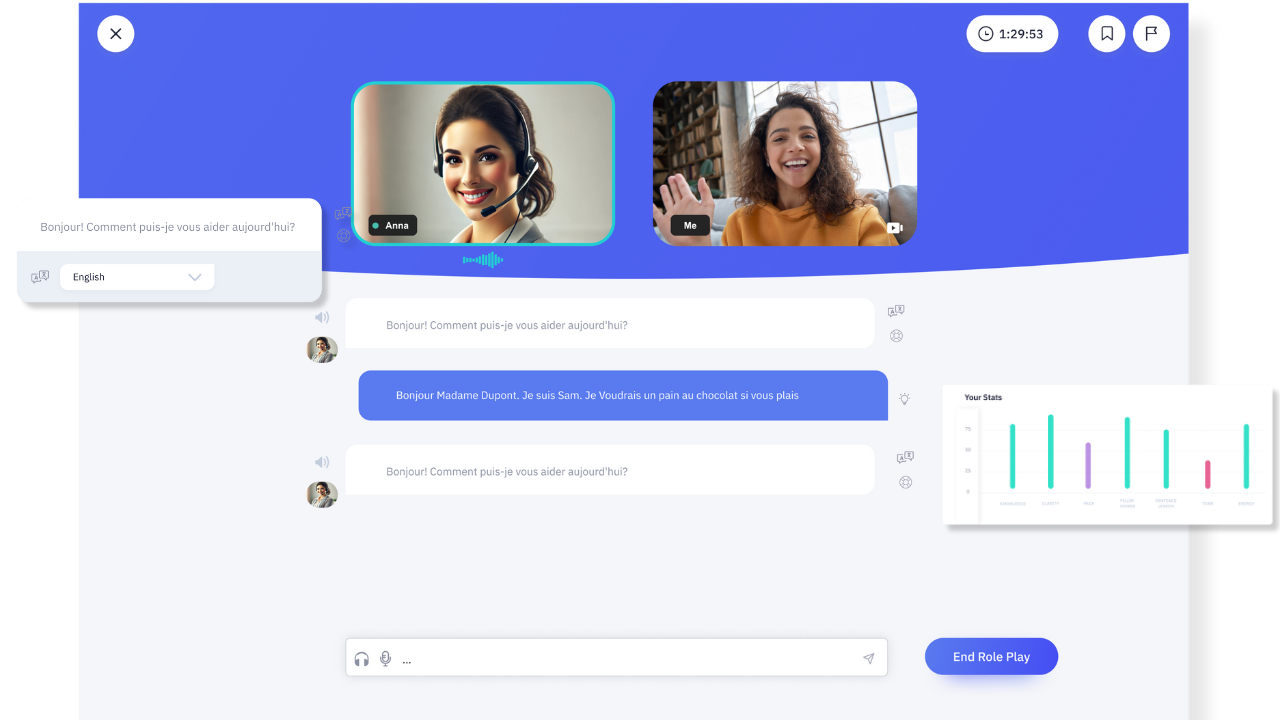
Shiken is a full learning platform and an AI language tool that includes quizzes for vocab, exams to test your knowledge, and courses for comprehensive language practice. On the learner plan you can create and share your own content and on the more expensive Creator plans you can create interactive AI roleplays in any language you like. This comes with full voice control with an always on microphone option and it can even activate your camera to make the conversation more realistic. If you get stuck in a conversation you can instantly translate things and ask for a hint on what to say next before getting feedback after each response and at the end of the whole conversation. It also comes with a learning tutor you can ask anything to
Pros:
- Instant feedback
- AI roleplays
- Create your own language roleplays
- Quizzes, roleplays and courses
- Ai tutor
Cons:
- Paid plans bring the most features
2. Duolingo - The Best App For a Gamified Approach

Duolingo is a widely recognized language-learning app, trusted by millions of users around the globe. Offering over 30 languages, the app provides lessons with a gamified approach, making it easy and fun to develop new skills.
Many users share positive feedback about Duolingo, praising its playful design and entertaining activities. They also highlight the app's bite-sized lessons, emphasizing how engaging they are and how effective they can be for learning a new language.
Pros:
- Gamification to make learning more engaging
- Bite-sized lessons
- Podcasts to help develop skills
Cons:
- The main focus is on reading and writing, not speaking or listening
- No real-life scenarios
- While Duolingo is great for vocabulary and grammar, it may not offer as much language practice in real-life conversational settings.
3. Babbel - The Best App For Structured Learning

Babbel helps users master a new language and enhance their skills. With the app, you can learn practical vocabulary for real-world situations through concise, bite-sized lessons. Its content is notably more challenging, making it a great choice for those with some prior language experience.
Reviews suggest that Babbel stands out as a more professional option compared to its competitors. It boasts numerous five-star ratings on Trustpilot from users who appreciate the app and their learning progress. Many also praise Babbel’s well-structured lessons, noting their effectiveness and the ease of following the repetition-based approach.
Pros:
- Content that offers a challenge to users
- Structured lessons
- Offers structured lessons that include opportunities for language practice in real-world scenarios
- Live classes
- Clear instructions
Cons:
- High subscription cost
- The amount of content depends on the language you choose
4. Talkpal - The Best App For Interactive Lessons

Talkpal is an AI-powered language learning tool designed to support learners effectively. The app creates immersive real-life scenarios, allowing users to acquire new phrases and vocabulary while applying them in context, similar to interacting with a native speaker. With a personalized learning experience tailored to your progress and initial language proficiency, Talkpal adapts to meet your needs.
The app has received numerous positive reviews, with its AI tutoring feature being a standout highlight. Users appreciate how the AI corrects mistakes and encourages repetition, mimicking the guidance of a human tutor. Additionally, the chat feature and 24/7 accessibility are frequently praised for enhancing the overall learning experience.
Pros:
- Personalized learning experience
- Subscription options
- Interactive lessons that provide ample opportunities for language practice with AI tutors
Cons:
- Lack of human interaction
- Caters to a specific learning style that might not work for everyone
5. Rosetta Stone - The Best App For Immersive Learning

Rosetta Stone is renowned for its immersive learning experience, built on the principle that the best way to learn is by diving right in. With a wide variety of languages to choose from, the platform features interactive activities and the ability to listen to native speakers, helping learners refine their skills. Its AI technology enhances the experience by simulating real-life scenarios for practical learning.
Online reviews highlight Rosetta Stone's user-friendly interface, immersive approach, and overall effectiveness. Many users emphasize the benefits of its immersive design, noting how it has significantly improved their understanding and language proficiency.
Pros:
- Bite-sized lessons
- Immersive environment to help learning
- Immersive environment that enhances language practice through real-life scenarios
- Speech recognition technology
Cons:
- Lacks information about incorrect answers
- Lacks reminders to continue lessons; commitment is required
6. Univerbal - The Best App For Conversations
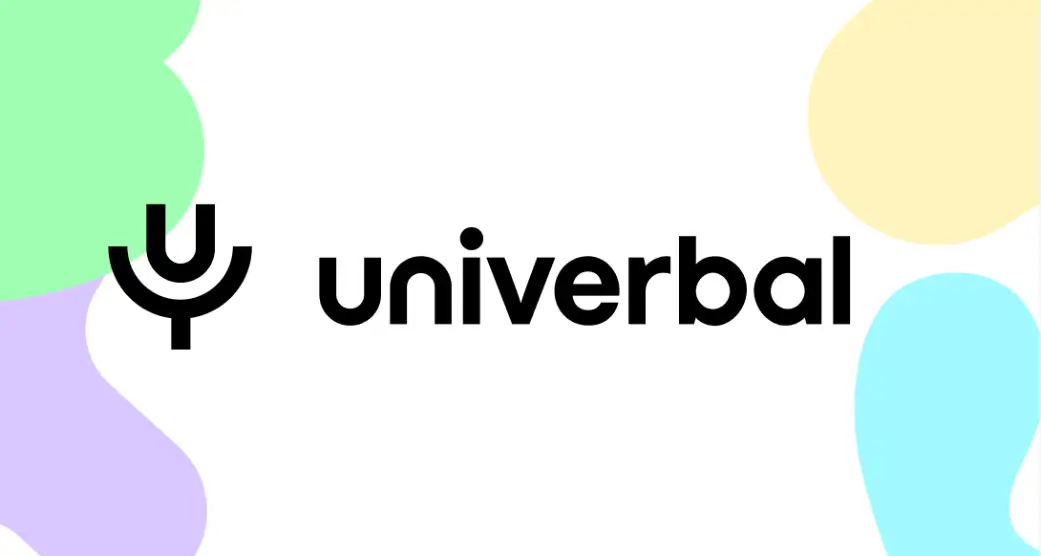
Univerbal is an AI-powered language tool designed to help users tackle real-world quests and challenges. The app lets you select from AI-generated images of people and start conversations on a wide range of topics, offering a dynamic way to practice.
Users frequently praise Univerbal for its ease of use and suitability for daily practice. Additionally, it’s lauded for its focus on enhancing conversational skills, making it a valuable tool for improving real-life communication.
Pros:
- AI-driven learning tool
- Real-life conversations and scenarios
- Real-time, instant feedback
- Choose from customizable topics
- Focuses on conversational language practice with AI-generated scenarios
Cons:
- A stable internet connection is required
- Not a huge selection of languages
7.Tutor Lily - The Best App For Real-Time Feedback
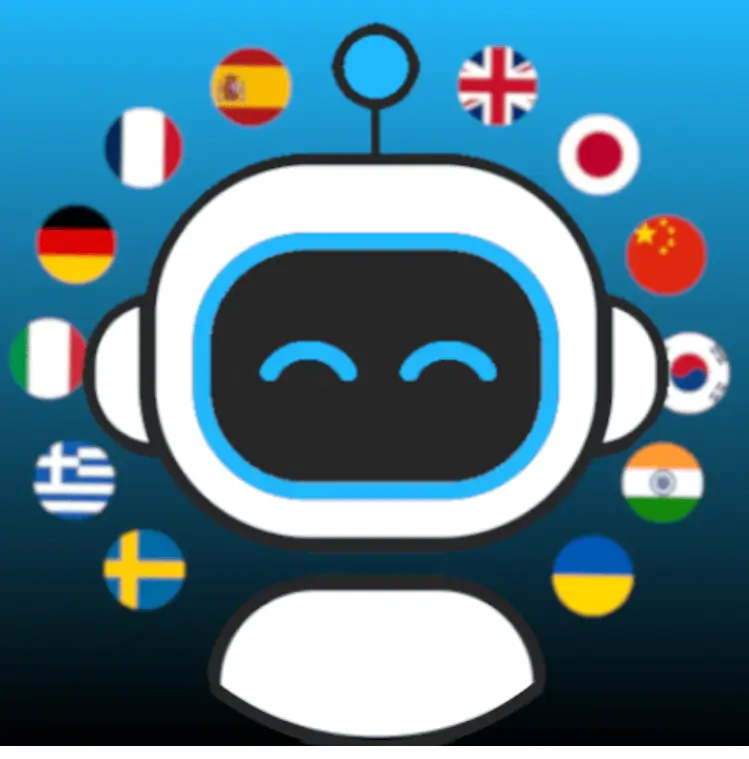
Tutor Lily is an AI-powered app that provides access to a language coach anytime, day or night. Simply select your desired language and start practicing your conversational skills immediately, all while receiving real-time feedback to improve your fluency.
The app has garnered numerous positive reviews, with users highlighting the value of its instant feedback and the significant progress they've made. Reviews also emphasize the clarity of the explanations and the convenience of the chatbot’s 24/7 availability, making it a highly practical tool for language learners.
Pros:
- Instant corrections and feedback
- Easy to practice conversational skills
- Real-time feedback that enhances language practice and conversational skills
- Pronunciation help
- Simple and easy to use
Cons:
- Lack of human interaction
- Progress is difficult to track on the app
8.Memrise - The Best App For Speaking Practice

Memrise is a well-loved language-learning app that focuses on repetition to reinforce learning. Using a spaced repetition system, the app predicts when you might forget a word or phrase and reinforces it through daily lessons and quizzes. With its strong emphasis on vocabulary, it’s an excellent tool for beginners building their language foundation.
Memrise receives largely positive reviews, with users noting how much they’ve learned in a short time. Many appreciate the ability to customize daily learning durations, adding a personalized touch that fits various schedules and learning styles.
Pros:
- Native speakers to help practice accent and vocabulary
- Encourages you to learn new vocabulary
- MemBot provides real-time, instant feedback
- Interactive lessons and games
Cons:
- The free version is quite limited
- Not much conversation practice
- Limited opportunities for language practice in conversational settings
9.Pratika - The Best App For Mobile
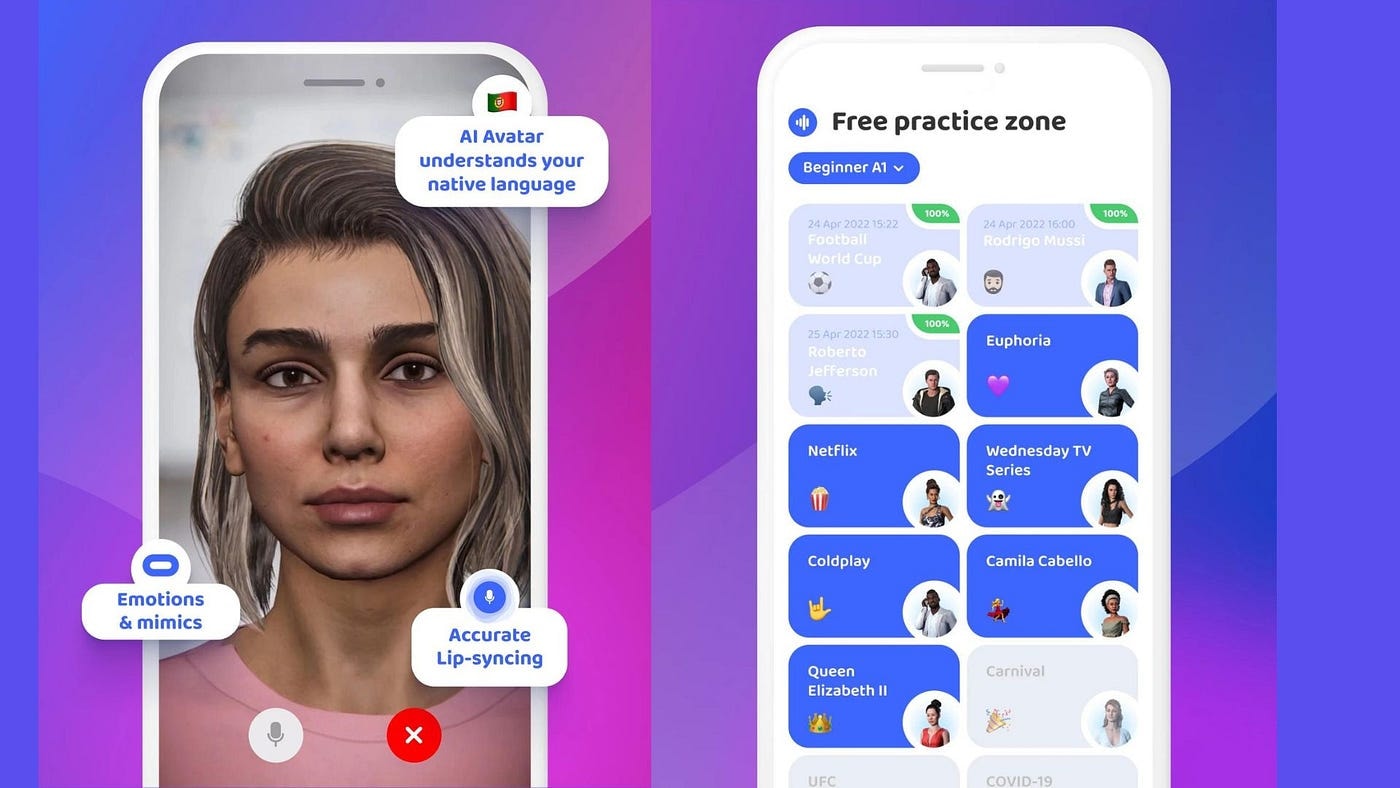
Praktika leverages generative AI avatars to deliver tailored English language learning experiences. By combining the accuracy of a tutor with the interactive appeal of an app, it provides personalized exercises informed by insights from millions of learners. Praktika caters to English language learners across various proficiency levels, offering a dynamic and engaging way to improve their skills. You can also create custom role plays in the app and a bit like Shiken Pratika features instant translation and hints within it’s app to help you navigate.
Pros:
- Personalized learning paths
- Engaging AI avatar tutors
- Mobile-first
- AI avatars that provide personalized language practice sessions
Cons:
- Monthly subscription
- Avatars not to everyone’s tastes
10.Busuu - The Best App For Gradual Learning

Busuu provides users with the chance to learn a new language while aligning with the Common European Framework of Reference (CEFR), an internationally recognized standard. The platform covers six stages, guiding learners from complete beginners to fluency.
Reviews for Busuu are largely positive, with users praising the interactive games and activities for making learning enjoyable. The community feedback feature is particularly well-received, with many users noting how it has significantly contributed to their skill development.
Pros:
- Practice with native speakers
- Bite-sized lessons
- Real-life scenarios
- Gradual learning approach that includes language practice with native speakers
Cons:
- Some features require a premium membership
- There is not as much cultural information and content as in other apps
11.Speak - The Best App For Pronunciation
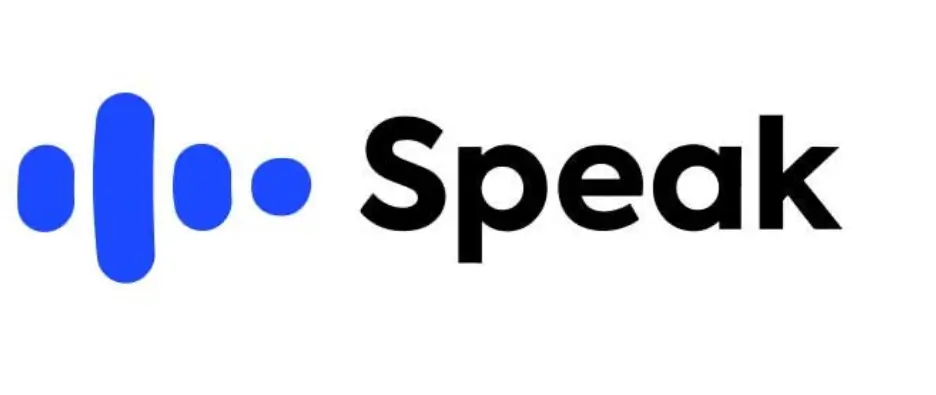
Speak is a language learning app that emphasizes the importance of speaking to master a new language. The app features “Speak Tutor,” an AI-driven bot that acts as a live tutor, helping users enhance their speaking skills through interactive practice.
Online reviews are mostly positive, with many users praising Speak for highlighting and explaining mistakes, which they find invaluable during the learning process. Additionally, the AI voice used for the Speak Tutor is often described as natural and non-robotic, making it more comfortable and engaging to listen to.
Pros:
- Focussed on speaking and pronunciation, providing ample language practice opportunities
- Real-time feedback
- A chance to see mistakes and learn from them
Cons:
- Less focussed on grammar and writing
- Not really suitable for total beginners
12.Lingvist - The Best App For Learning Vocabulary
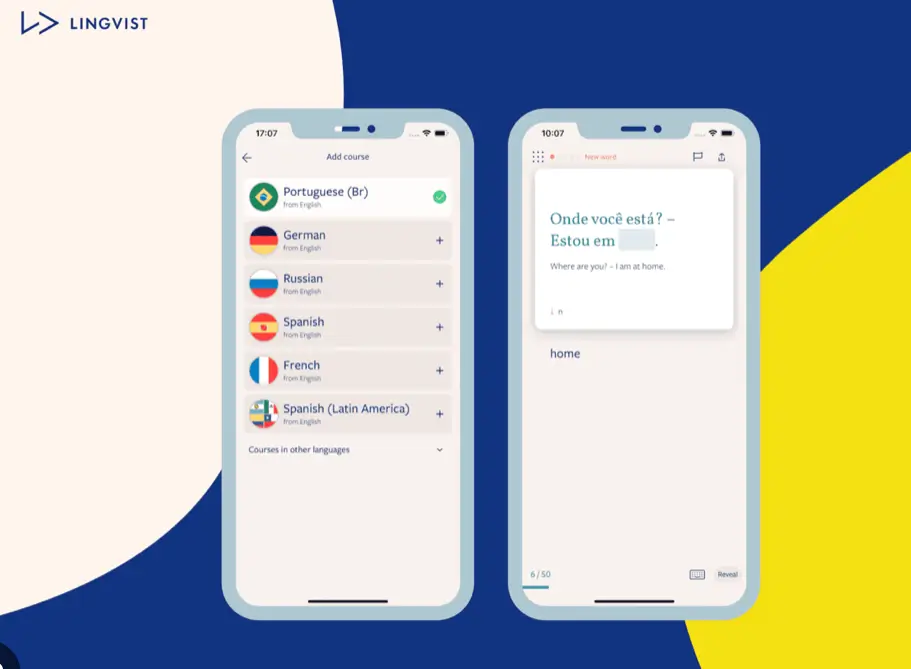
Lingvist is a language learning app powered by AI, designed to help users improve their speaking, writing, and reading skills in their chosen language. The AI tutor tailors the learning experience by adjusting the difficulty levels based on individual progress, ensuring a personalized approach.
Users have shared positive feedback about the app, highlighting how effectively the algorithm keeps vocabulary relevant to their needs. Additionally, many commend the app for its enjoyable interface and the company’s dedication to making the learning experience as engaging as possible.
Pros:
- Focuses on vocabulary
- Progress-tracking
- 50+ language courses
Cons:
- Less focus on listening and speaking skills
- Limited free options
- Limited focus on language practice in conversational settings
13.ChatGPT - The Best App For Practicing Conversations

If you're looking to practice natural conversations, ChatGPT offers a wide range of topics to explore. While it’s not specifically designed for language learning, it’s a popular tool for anyone looking to enhance their conversation skills. With its ability to generate human-like responses, ChatGPT is especially useful for practicing conversations in a different language.
Users frequently leave positive reviews, highlighting how the platform has helped them develop various skills. They appreciate the quick responses and the vocabulary suggestions that can be applied in real-life scenarios. Additionally, many enjoy the “speak” feature, which is particularly helpful for improving pronunciation.
Pros:
- Multiple languages are available
- Wide range of real-life topics to practice vocabulary
- Ideal for language practice through natural conversations on a variety of topics
Cons:
- No progress-tracking feature
- The output depends on the user’s input
14.Mondly - The Best App For Interactive Lessons
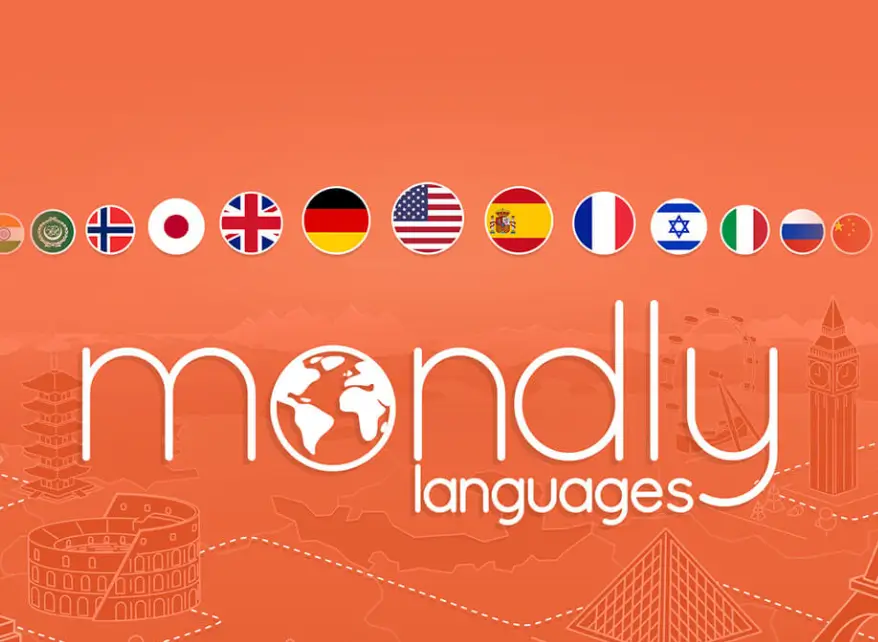
If you're looking for a fun way to learn a new language, give Mondly a try! With over 41 languages to choose from, the app features an AI chatbot tool that lets you practice everyday conversations. You can also listen to native speakers and improve your pronunciation by repeating their phrases.
Mondly has received plenty of positive reviews. Users often praise the app's well-curated vocabulary selection and the practicality of its daily tasks. Many also enjoy the variety of topics available and describe the lessons as engaging and enjoyable.
Pros:
- Gamified approach
- Speech recognition technology
- Daily lessons
- Interactive lessons that provide opportunities for language practice with native speakers
Cons:
- Speech recognition is not always that accurate
- Limited access with free option
15.Eggbun Education: The Best App For Asian Languages

Eggbun Education is a language learning app tailored for those interested in Chinese, Korean, and Japanese. The app features a charming character named Lanny, who tracks your progress and guides you through the lessons. To enhance your learning experience, users are encouraged to download an Asian keyboard, deepening their understanding and familiarity with the language.
The app has garnered positive reviews, with users praising its focus on conversational skills and the integration of Korean culture, which they find highly engaging. Lanny, the chatbot, is a standout feature, with many users highlighting how much it has helped them throughout their learning journey.
Pros:
- Asian-specific
- Virtual tutor (Lanny)
- Promotes conversation
- Focuses on conversation and language practice with a virtual tutor
- The chance to learn about culture
Cons:
- Limited language options
- Some users might prefer more feedback
16.Pimsleur - The Best App For Listening

Pimsleur offers a unique approach to language learning, claiming you can sound like a near-native in just 30 days by dedicating 30 minutes a day. Based on the research of Dr. Paul Pimsleur, a renowned linguistics professor, the program emphasizes learning through hearing languages in everyday contexts and responding naturally.
Users often praise this method, sharing their satisfaction with the progress they’ve made in conversational skills by simply listening to native speakers. Many also highlight the app’s convenience and accessibility, noting how easy it is to use on the go, making it a popular choice for busy learners.
Pros:
- Hands-free to listen on the go
- Convenient 30-minute lessons
- Backed by research
- Listening exercises that enhance language practice through everyday situations
Cons:
- Less focus on writing and grammar
- Visual learners might not enjoy the approach
17.Drops - The Best App For Causal Progress

Drops is an AI-powered language learning app that takes a gamified approach to teaching over 50 languages. The app uses fast-paced, engaging games to help users build their vocabulary and improve their language skills in a fun and efficient way.
Users frequently praise Drops for the quick progress they make and how the gamified design keeps them motivated and focused. Many also appreciate the app’s casual pace, highlighting how it seamlessly fits into their daily schedules, making language learning both accessible and enjoyable.
Pros:
- Gamified approach
- Visually engaging
- Good for building vocabulary
Cons:
- Inconsistent repetitions
- Less focus on grammar and conversation skills
- Less focus on language practice in conversational settings
18.Loora - The Best App For Learning With a Tutor
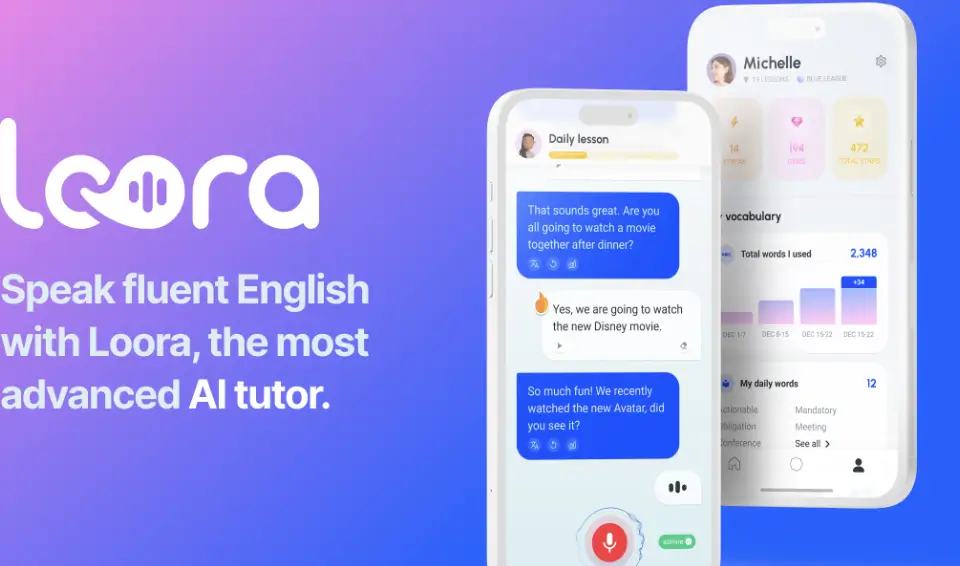
Loora is an AI-driven language learning platform that offers users an AI English tutor for personalized practice. The platform is designed to accelerate skill development by providing instant feedback, helping learners stay on track while enjoying a supportive, judgment-free environment.
A standout feature highlighted in reviews is Loora’s excellent speech recognition, which users say makes practicing much more seamless. Additionally, many appreciate the variety of topics available, keeping the learning experience engaging and diverse.
Pros:
- Real-time feedback and instant corrections
- Pressure-free zone
- Constant availability
- AI tutor that provides personalized language practice sessions
Cons:
- Lack of human interaction
- Subscription is required
The Best AI Learning Apps for Different Languages
Certain AI language learning apps are tailored to work best for specific languages, providing targeted tools and techniques to help users learn effectively and make consistent progress. Below is a list of some of the most popular languages and the top AI language learning apps designed to help you succeed:
English
- Duolingo: Offers users the chance to learn writing, reading, and listening skills.
- Babbel: Babbel is focused on vocabulary and conversation.
- Rosetta Stone: Works by immersing users in the language to develop their skills and practice in everyday scenarios.
Spanish
- Shiken: The AI daily lessons and gamified approach help users refine their pronunciation.
- Memrise: Offers users the chance to develop their vocabulary skills through repetition and video content.
- Busuu: Offers corrections for speech and grammar to help users perfect their skills.
German
- Mondly: Daily lessons to keep up with progress and real-life conversations with natives to practice pronunciation.
- Seedlang: Takes users through video clip flashcards and offers a grammatical breakdown.
- FluentU: Lets users watch German clips for immersive learning.
French
- HelloTalk: Users can interact with French speakers around the world and mingle with real people.
- Shiken: Offers an AI tutor with 24/7 availability to help users progress.
- Pimsleur: Learn on the go and listen to French audio.
Chinese
- SuperChinese: Offers a gamified approach for learners at any level.
- LingoDear: Detailed explanations, engaging lessons, and a gamified approach.
- Ling: Covers pronunciation and vocabulary in a game-like way.
Portuguese
- Shiken: Offers real-life conversation practice with an AI tutor.
- Duolingo: Gamified approach to help users learn vocabulary, grammar, and pronunciation.
- PortuguesePod: Offers short audio and video clips to help learners at any stage.
Hindi
- Drops: Takes users through vocabulary-building exercises and conversational Hindi.
- Clozemaster: Uses a gamified approach through flashcards for repetition.
- Talkpal: Teaches users keywords and phrases with real-time feedback.
Russian
- Speechling: Teaches users how to pronounce Russian words correctly.
- Tutor Lily: Offers personalized language conversations with AI.
- Tandem: Connects language learners with native speakers to practice.
Bengali
- Talkio.AI: Practice speaking Bengali with AI tutors.
- Ling: Offers the chance to use the chatbot and fun quizzes.
- Yeschat.AI: Lets users try out the different modules to enhance their skills.
Language Learning Apps Suitable For Children
Who says language learning apps are just for adults? There are plenty of apps tailored for young learners, offering tools and programs designed to engage the curious minds of children. Here are some great options to inspire you:
- Gus On The Go: Designed for children aged 4-6, this app uses engaging, bite-sized lessons to teach basic everyday vocabulary. Its main character, Gus the owl, travels the world, introducing new words and phrases in each location he visits.
- Rosetta Stone: This interactive, picture-based app is an excellent choice for kids. Like its adult counterpart, it employs an immersion technique, encouraging children to deduce meanings without relying on their native language.
- LingoPie: Perfect for children, this app uses shows and movies to introduce a new language. It even allows parents to create flashcards or adjust controls to fit their child’s learning style.
- Mondly Kids: With daily lessons designed for children, Mondly Kids delivers short, engaging sessions that focus on vocabulary and grammar. The app uses colorful cartoons and characters to keep kids entertained during its 10-minute lessons.
These apps make language learning fun and interactive, helping kids pick up new skills effortlessly!
Different Types of AI Language Learning Apps
AI language learning apps come in various types, each tailored to serve a specific purpose while guiding you toward the same goal: mastering a new language. Whether it’s improving conversational skills, building vocabulary, or refining pronunciation, these apps provide specialized features to meet diverse learning needs and preferences.
Here are some of the different types:
Here’s the reordered list of AI language learning app types:
- Vocabulary-Building and Practice Apps: Focused on reinforcing vocabulary through flashcards and repetition, these apps are great for beginners aiming to establish a strong foundation.
- Gamified Learning Apps: By incorporating fun activities and games, these apps make learning enjoyable and are particularly popular among children looking to learn a new language in an entertaining way.
- AI Tutor Apps: Featuring AI tutors that provide real-time feedback and suggest corrections, these apps are suitable for learners who want personalized support throughout their journey.
- Immersive Apps: Using immersive techniques such as VR headsets or interface customization in the target language, these apps are perfect for learners seeking an engaging and enriched learning experience.
- Conversation-Based Apps: Ideal for enhancing pronunciation and practicing speaking skills, these apps are perfect for travelers and advanced learners looking to refine their conversational abilities.
Conclusion: The Future of Language Learning with AI
The future of language learning is incredibly promising, thanks to the advancements in AI-powered language learning apps. These apps are revolutionizing the way we learn languages by offering personalized learning experiences, interactive lessons, and real-life scenarios that simulate conversations with native speakers. As AI technology continues to evolve, we can expect even more innovative language learning apps that cater to different learning styles, languages, and proficiency levels.
In conclusion, AI language learning apps are an excellent tool for improving language skills. By choosing the right app, setting clear goals, and practicing consistently, language learners can achieve their language learning goals and become proficient in their target language. The integration of AI in language learning is not just a trend but a significant leap towards more effective and engaging language education.

